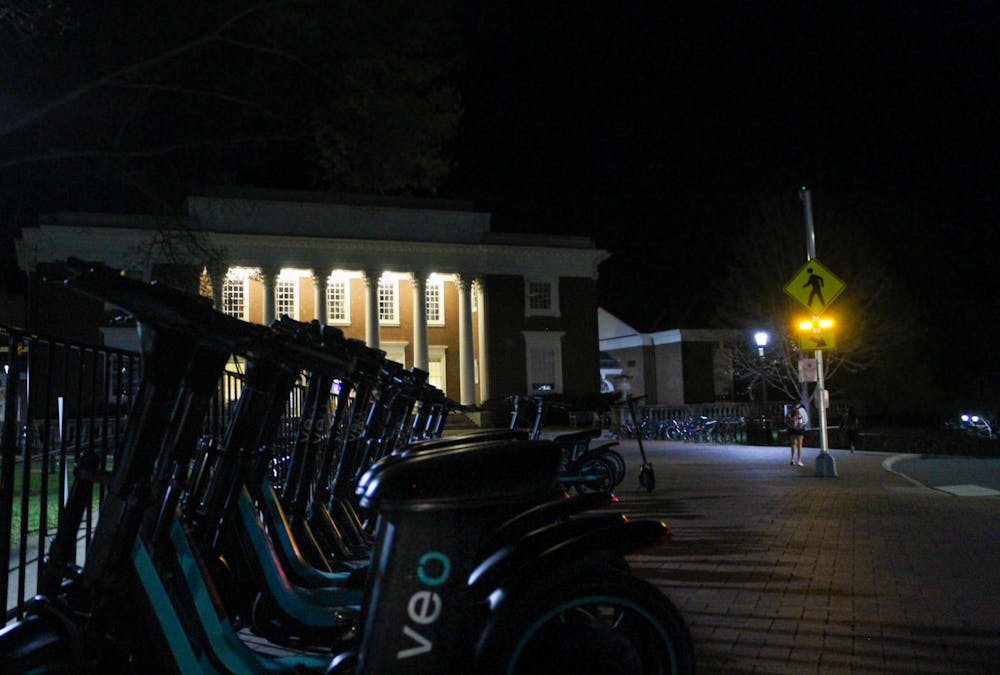The University Police Department has increased the number of e-scooter traffic stops around Grounds, along with issuing more citations to stopped riders, as of April 1 in an effort to encourage legal ridership. In this new initiative to encourage safe and legal use of e-scooters, University Police are working to raise awareness of both state laws and local policies that classify e-scooters as vehicles subject to all traffic regulations through informational tabling and traffic stops that result in citations.
E-scooters are popular among students as a mode of transportation when commuting to classes. Students either personally own e-scooters or rent them through app services such as VeoRide, an e-scooter and e-bike vendor which partners with several cities and universities across the country to distribute e-scooters.
Since 2019, Veo has been the only e-scooter provider to receive permits to operate in Charlottesville and on Grounds, according to University spokesperson Bethanie Glover. The City’s permit specifies that Veo is allowed up to 700 e-scooters within the Charlottesville area, and an average of 525 e-scooters were on Grounds during the 2023-24 academic year.
As for official regulations on Veo ridership, Virginia law 46.2-100 states that a motorized scooter is considered a vehicle when operated on a public roadway and therefore must follow all traffic laws. In addition, Charlottesville City Code Sec. 15-246 prohibits e-scooters from riding on sidewalks.
UPD Sergeant Beckett Thelen says that although state and local policies are not new, UPD has recently recognized a gap in knowledge around e-scooter regulations in the University community that he says needs to be addressed.
“[UPD] decided we needed to raise awareness,” Thelen said. “We needed to educate any of our students, faculty, staff or visitors that utilize e-scooters so that they can have safe ridership whenever they elect to use this alternative means of transportation.”
A warning phase started in mid-March when UPD members began tabling around Grounds, passing out flyers to students with details of the e-scooter state law. Thelen said that while official traffic stops and citations began April 1, these education efforts will continue through the end of this semester.
Similarly to Thelen, Glover said that the University’s focus when considering the use of e-scooters is educating students about safe ridership, both on Grounds and in the surrounding Charlottesville area.
“We hope that the education and awareness we are bringing towards electric scooter ridership will positively change how electric scooters are ridden, with an emphasis on safe and lawful operation,” Glover said.
University policy SEC-043, published in Feb. 2019, also states that motorized scooters and electric power-assisted bicycles are required to obey applicable traffic regulations. Provisions included in the University's policy require e-scooter riders to wear a helmet, yield to pedestrians in crosswalks and avoid riding on sidewalks. However, Thelen said officers are only enforcing state and local laws, not University traffic policies.
Per Virginia law, an operator of an e-scooter, whether personally owned or rented, can be issued a traffic citation in the same manner as a car in a traffic stop, but Thelen said he hopes these citations can be avoided through their educational initiatives. He said UPD is not trying to deter or restrict ridership, but rather help raise awareness so that people understand how to stay safe and ride e-scooters lawfully.
A U.S. Consumer Product Safety Commission report released in 2022 showed a near 21 percent increase nationally in injuries related to e-scooter use, which Thelen said is consistent with the increase in e-scooter accidents the UPD has seen at the University.
Second-year College student Yury Park said she previously rode Veo e-scooters until she was injured last spring while riding one. She said she ended up in the emergency room due to jumping off an e-scooter when she gained too much speed riding down a hill and could not brake properly.
Park said she has avoided riding e-scooters since her accident, and that it is important the e-scooter regulations be enforced due to the danger that can occur from riding e-scooters, especially on main roads with cars.
“Without these restrictions, I think it’s really dangerous for students to be riding them, especially when it’s raining or at night when it’s dark,” Park said. “I think if I really needed to ride [an e-scooter], I would if the restrictions were [enforced].”
Third-year College student Sally Bussian said she thinks it is important for students to be aware and follow traffic rules when riding on the road, such as stopping for stop signs and pedestrians. However, she said she does not support police enforcing traffic stops for e-scooter riders because it will deter people from using the e-scooters.
“I don't think that it's necessary for police to be lurking and waiting for students to make a mistake on the Veo,” Bussian said.
Despite UPD’s efforts over the last week to raise awareness around Grounds and among students, Bussian said she was unaware of the initiative and had never heard of rules regarding riding e-scooters. According to Bussian, first-year students make up a large portion of e-scooter users on Grounds, so informing them of traffic rules surrounding e-scooters via announcements from Residential Advisors and schoolwide emails should be a priority.
Third-year College student Meghana Annamaneni agreed that publicity of these efforts by police will be instrumental in changing students’ behaviors. Annamaneni said that whether or not the police enforcement will lead to better road safety depends mainly on students spreading the word about the increasing traffic stops.
“If people start hearing that other people have been ticketed, I think that will definitely help enforce these regulations,” Annamaneni said.
More information about e-scooter safety is available on UPD’s website.







